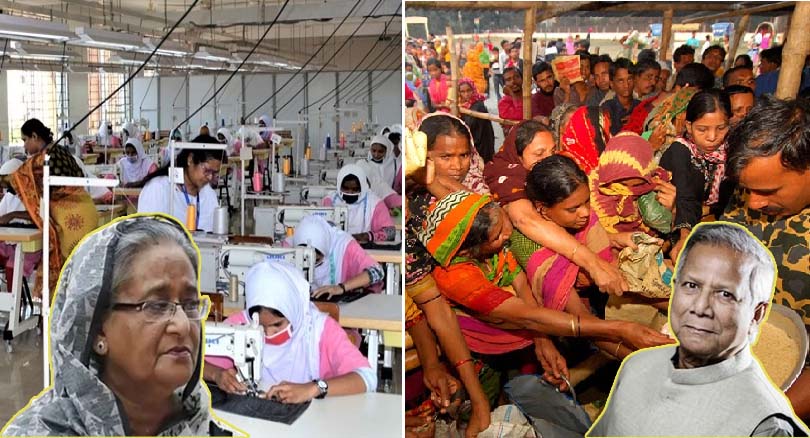
- Under Sheikh Hasina, Bangladesh was recognized for its low-cost manufacturing, attracting international companies and investment.
- After the crisis, people employed in these sectors report that they are no longer receiving the wages they once did, as companies and opportunities have diminished.
- The interim government has shown clear bias towards the Muslim population and has acted against the interests of Hindus in Bangladesh, while also distancing itself from India.
- Pandering to Islamic radicals could undo the country’s limited progress over the years and also turn Bangladesh into a hub for Islamic radicalism, fostering violence and instability in the region.
Bangladesh experienced a major political shift on August 5, 2024, when a politically motivated student protest led to the removal of the legitimate government. This resulted in an interim government under Muhammad Yunus. It is often said that political stability brings economic stability, and any changes can adversely affect the latter. A similar situation has unfolded in Bangladesh, where a month of political instability has severely damaged the country’s economic prosperity. Once considered a rising manufacturing hub under Sheikh Hasina, Bangladesh now faces the risk of becoming the ‘sick man’ of South Asia.
The economic situation in Bangladesh has become very turbulent, with food inflation hitting 14% in August, the highest in 13 years. Never during Sheikh Hasina’s tenure was food inflation this high, yet it has surged within just one month of the interim government taking over. In addition, overall inflation has reached a record 12%, a 12-year high. The entire supply chain has been disrupted, reducing both the import and export cycles. A particularly concerning issue is the financial sector, especially the banks, which are crucial for the country’s economy. The situation at the Bangladesh Bank is deteriorating, with the Social Islami Bank facing a severe crisis. In a viral video, the bank’s head was seen in tears as the bank struggled to return depositors’ money. Other major banks in Bangladesh have also been unable to return depositors’ money over the past 4-5 weeks, leading to a deep financial crisis. A particularly hard-hit group of banks includes the Sharia-compliant (Sukuk) banks operating across the country.
More importantly, one of the most strategic sectors of Bangladesh’s economy—its primary sectors and low-cost manufacturing, especially the garment industry for which the country was well-known—has collapsed in just 2 months of interim government rule. Under Sheikh Hasina, Bangladesh was recognized for its low-cost manufacturing, attracting international companies. However, the primary and manufacturing sectors have suffered drastically due to the political crisis. People employed in these sectors report that they are no longer receiving the wages they once did, as companies and opportunities have diminished.
Even India, which was one of the major recipients of low-cost manufacturing from Bangladesh, has been impacted. Due to the unwise decisions of the interim government, Bangladesh prematurely cut off trade deals with India, which previously provided pulses, spices, and dry fruits. This has reduced imports, and in return, the Bangladeshi government has also decreased its exports.
The government must realize that economic relationships are not governed by mere emotions, ideas, or ideologies. The interim government has shown clear bias towards the Muslim population and has acted against the interests of Hindus in Bangladesh, while also distancing itself from India. In just 2-3 months, the interim government has undone many of Bangladesh’s ties with India, halting ongoing Indian infrastructure projects and removing holidays related to Bangladesh’s liberation. Instead, it is seeking closer ties with Pakistan, despite Pakistan’s dire economic condition.
The interim government’s approach is not pragmatic and is driven by narrow interests, which do not bring prosperity. What drives prosperity is understanding what is important for Bangladesh’s economy. Bangladesh is a smaller economy in the region, and fostering good relations with India is crucial to its economic growth. By cutting off trade and halting development projects, the only loser in this situation will ultimately be Bangladesh.
During the recent Durga Puja festival, a major Hindu event, radical Muslims in Bangladesh reportedly targeted the celebrations. There were reports of ISIS flags being marched through the streets of Dhaka, and radical voices, particularly those expressing hostility toward India, were openly welcomed. Religious minorities and their institutions are being targeted based on religious values. These developments are a troubling sign for Bangladesh, representing a significant step backwards. Not only could they undo the country’s limited progress over the years, but they could also turn Bangladesh into a hub for Islamic radicalism, fostering violence and instability in the region. This would not benefit the wider population of Bangladesh.
It is now up to the people of Bangladesh to decide the future of their independence. Do they want freedom where there are no economic opportunities, with daily political turmoil and radical elements being welcomed into the country, potentially turning Bangladesh into the new radical hub of South Asia? Or do they want a freedom where growth and prosperity, like that of neighbouring India, are embraced? Bangladesh is at a critical juncture, and the current trajectory, along with the interim government’s actions, suggests the country is in a dire situation and moving backwards.
References:
- https://www.indiatoday.in/global/story/how-bangladeshs-economic-crisis-impacts-regional-geopolitics-and-indias-interests-2594467-2024-09-05
- https://www.firstpost.com/opinion/from-isis-flag-marches-to-radicalisation-why-rise-of-hizb-ut-tahrir-in-bangladesh-alarms-india-13825346.html/amp
- https://x.com/ByRakeshSimha/status/1846550984979308643?t=P5a1_j21mEUl2azoFfFM1A&s=08
Aayush Pal is a freelance writer on contemporary geopolitical developments. The views expressed in his work are entirely his own.
